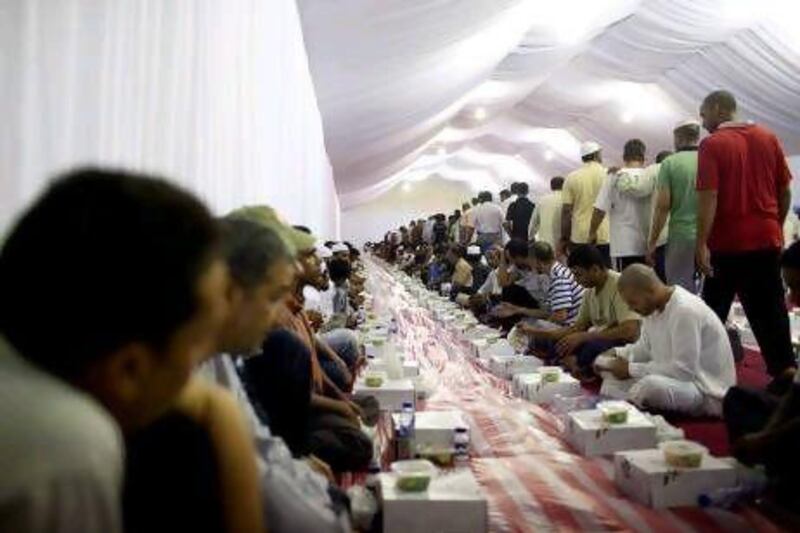ABU DHABI // Abdul Nasser Chakkaliparambil joined thousands of people of various nationalities breaking their fast at the Sheikh Zayed Grand Mosque on Wednesday.
People who want to have iftar there can travel on nine free bus routes spread across Abu Dhabi and the suburbs.
The services, run by the Department of Transport, operate daily between 5pm and 10pm.
From the embassies area on Airport Road, Mr Chakkaliparambil took a bus on Route 32 that departed from Marina Mall. He got off just a few metres away from the Grand Mosque.
"Ramadan is very special to us," said the 38-year-old Indian driver, who works at an embassy. "It's a time for us to fast, pray and cleanse our body and soul."
Busloads of labourers from Al Shahama, Workers Village in Mussaffah, Industrial City of Abu Dhabi, Mussaffah bus station, Baniyas West bus station and Al Mafraq Workers' City arrived at the Grand Mosque before the maghrib call to prayer.
"All these buses arrive here every day from the labour camps," Mr Chakkaliparambil said. "This is a good initiative, especially for people like us."
Emirati officials and volunteers ushered people, most of them workers, into one of the 12 air-conditioned tents at the Grand Mosque's gardens. Each tent holds up to 1,500 people. They are open to both Muslims and non-Muslims.
This year, 20,000 meals are being prepared and delivered daily by the Armed Forces Officers Club, according to the Sheikh Zayed Grand Mosque Centre.
On Wednesday, people broke their fast with rice, chicken, a vegetable salad, an apple, dates, juice, water and laban.
Mahbubul Alam, 35, a Bangladeshi taxi driver, said it was the first time he had broken his fast at the Grand Mosque since moving to capital in 2010.
"It's cool and very comfortable," he said. "But I have to eat and leave quickly because my taxi is parked far from the mosque."
Ismail Nalakath, 45, an Indian company driver, said the community spirit of the mass iftar appealed to him. He visits the Grand Mosque daily to break his fast with his friends and strangers of different nationalities, social status and religion. "I've been doing this for the past three years," he said. "I later pray at the mosque after iftar."
Those who arrived late sat in the mosque gardens a few metres away from the air-conditioned tents.
Kiran Shrestha, a 39-year-old Nepalese driver, said the heat and humidity did not bother him. "It's hot but everyone is happy to be here," he said. "We're grateful for all the preparations and the good food."
Free shuttle buses then take the labourers back to their camps.
"I'll be back here tomorrow," said Girishan Nadulpart, 42, an Indian carpenter who waited for the bus to take him home to the Icad labour camp in Mussaffah.






